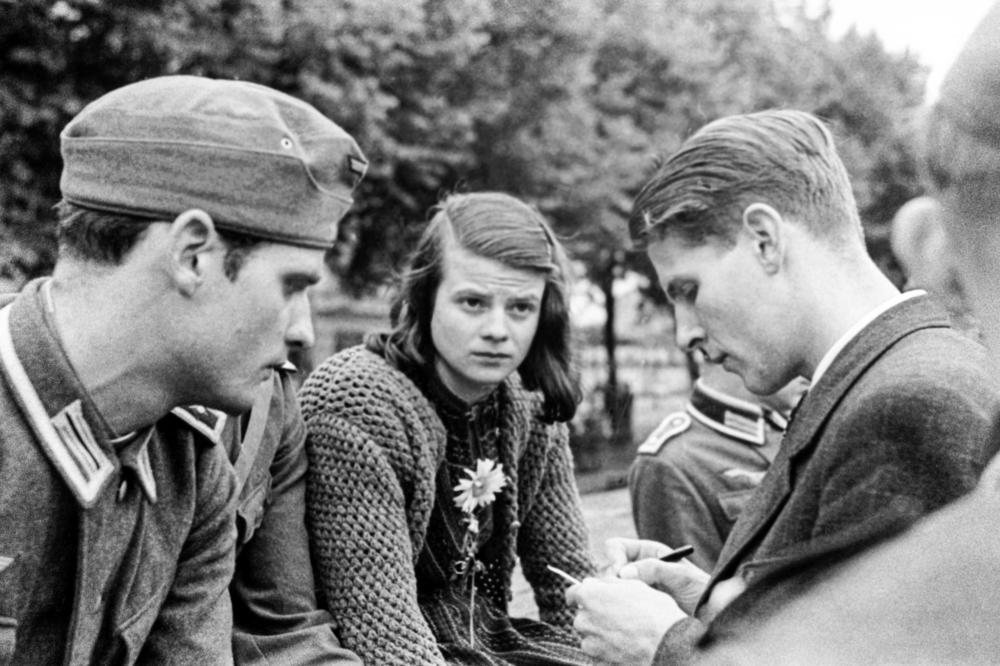Finding Her Own Way
Sophie Scholl would have turned 100 on May 9
May 04, 2021
Members of the White Rose resistance group: Sophie Scholl between her brother Hans Scholl (at left) and Christoph Probst. The photo shows the students on July 22, 1942, at the military collection point at the Ostbahnhof train station in Munich.
Image Credit: AKG Images
“The way Germans view Sophie Scholl has changed over the decades. In the 1940s she was viewed as a traitor, while in the 1950s, she was often idealized. Today we have a more realistic image of her as a resistance fighter,” says Johannes Tuchel. A professor of political science at Freie Universität Berlin, Tuchel heads the German Resistance Memorial Center.
First an Enthusiastic Supporter, then a Resistance Fighter
Initially, Sophie Scholl was enthusiastic about National Socialism and in the 1930s was involved in the youth organization “Bund Deutscher Mädel.” She later began to oppose the Nazi system and, as a student, became a member of the White Rose resistance group in Munich.
“As part of her personal development, Sophie Scholl freed herself from National Socialism,” says Tuchel. “She thought a lot about herself as a young woman and made decisions based on her Christian values and philosophical convictions.” Letters to her long-time friend Fritz Hartnagel demonstrate how she reflected on her life and her relationships. “Sophie Scholl was a fascinating individual,” says Professor Tuchel. “She was interested in many things and did not blindly follow the dictatorship.”
Leaflets Urged Resistance
During the winter of 1942/1943, together with her brother Hans and their friends Alexander Schmorell and Christoph Probst, Sophie Scholl fought against the Nazi regime in a resistance group they called the White Rose. The leaflets they produced called for an overthrow of the government. The siblings and their fellow students distributed the leaflets in Munich and other cities. Sophie and Hans Scholl were discovered and arrested while distributing the sixth leaflet in a building at the university in Munich. Just four days later, the President of the “People’s Court,” Roland Freisler sentenced both of them and Christoph Probst to death for treason. All three were executed the same day.
Tuchel points out that due to her early death at the age of 21, Sophie Scholl was ascribed the image of a martyr, among other things. Tuchel contradicts this image, saying, “She was a politically active young woman under the conditions of the dictatorship.”
Political scientist Tuchel links the last main leaflet campaign of the White Rose group with the defeat of the German Wehrmacht at Stalingrad. He says, “At that time Sophie Scholl and the other members of the group thought the end of the war was imminent. The leaflet campaign of February 18, 1943, was a conscious political decision. The members of the group wanted the German people to free themselves from the criminal regime of National Socialism on their own.”
Fame due to a Book The White Rose
While the war was still going on, resistance against National Socialism enjoyed no support from the German population. Even after the end of the war in 1945, the actions of the White Rose group were viewed with skepticism, especially in West Germany.
A book changed that. In 1952 Sophie Scholl became famous through a book written by her sister, Inge Scholl. The White Rose tells the story of the resistance group. Suddenly, in the 1950s and 1960s, Sophie Scholl came to be perceived as a victim, a heroine, an idealist. Tuchel says that at that time, her political motivation did not play a role, but rather that people could say to themselves, “I couldn’t have done it myself, but she could do it.”
Today the public perception of Sophie Scholl is more differentiated. Nevertheless, the “mythologization of her action” continues to be used for various purposes.
Memory of Sophie Scholl Abused by AfD
In 2017 the populist party AfD advertised on one of its election posters with the slogan “Sophie Scholl would vote for the AfD.” In 2020 a speaker at a “Querdenken” demonstration against the coronavirus measures compared herself with Sophie Scholl.
Professor Tuchel says that these attempts at instrumentalization and identification need to be sharply rejected. “Sophie Scholl stands for tolerance and the rule of law, not for intolerance and exclusion,” he says. Indeed, “The resistance fighter Sophie Scholl tried to find a way to maneuver within a dictatorship. How can anyone compare that to protesting and participating within a democracy?”
This text originally appeared in German on April 24, 2021, in the Tagesspiegel newspaper supplement published by Freie Universität.
Further Information
Prof. Johannes Tuchel, Freie Universität Berlin, Department of Political and Social Sciences, Institute of Political Science, Email: tuchel@gdw-berlin.de

